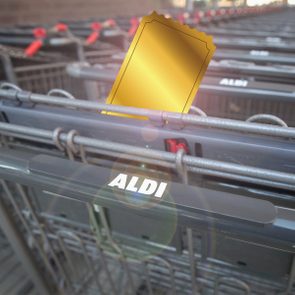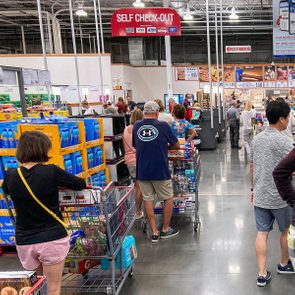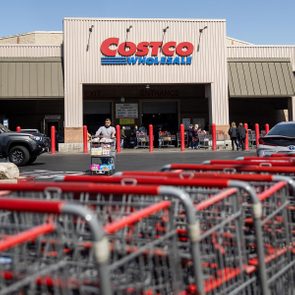At least the rotisserie chicken is safe
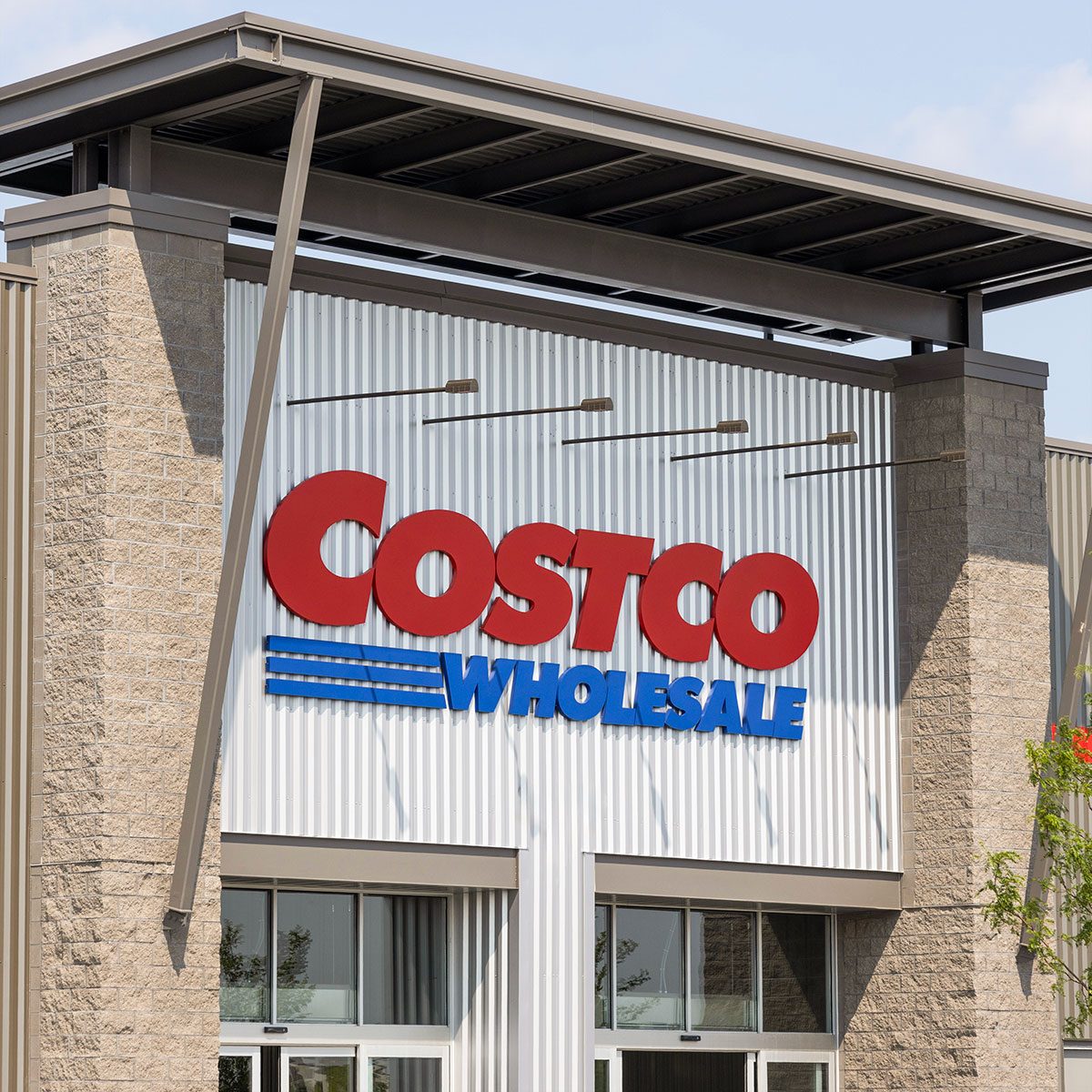
These 8 Costco Products Will Likely Cost More Thanks to Tariffs

No matter where you turn, the talk is about President Donald J. Trump’s recent tariffs and their impact on the economy. Though the implementation has been start-and-stop with pauses, shifting deadlines and different rates for different countries, tariffs have begun rolling out, and you can expect price hikes on consumer goods to follow.
As of April 9, the White House issued a 90-day pause on additional tariffs to most countries, leaving in place the 10% tariff across the board. (That pushes the start date back to July 8.) At the same time, it raised tariffs on Chinese imports to 125%.
All shoppers are wondering how the tariffs will affect their household’s bottom line, especially when it comes to feeding their families, and the outlook isn’t good. “Although the U.S. is a major exporter of food items, it is also a major importer of food supplies in the world,” explains Mohammad Elahee, PhD, professor of international business at Quinnipiac University. “The U.S. imports about 20% of all food items consumed in the country, totaling about $150 billion to $180 billion per year. Due to climatic conditions, the U.S. cannot produce everything that American people consume, like tropical fruits such as mango.”
Even Costco, the warehouse club beloved for keeping its prices low, may start to feel the squeeze if and when the tariffs do go into effect, especially with many bestselling Kirkland Signature items sourced from nations around the globe. “Economists caution that the recent tariffs will result in considerable price increases for everyday Costco items,” confirms Nari Viswanathan, senior director of supply chain strategy at Coupa, an AI Total Spend Management platform.
Read on to find out which products will likely get hit with a price increase at Costco.
Get Reader’s Digest‘s Read Up newsletter for more shopping news, humor, travel, tech and fun facts all week long.
Which Costco products will cost more?
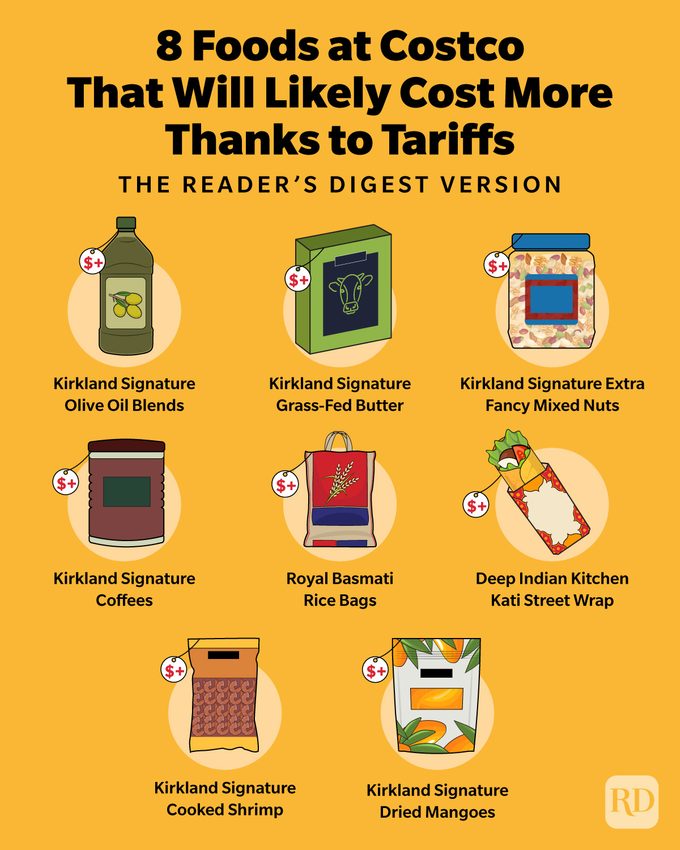
Without a crystal ball in front of us, we can’t say for sure which Kirkland Signature products will see the biggest price hikes in response to tariffs. However, there are some indicators to consider, including knowing which countries Costco imports the product or the product’s ingredients from. Here’s what is likely most at risk:
Kirkland Signature Olive Oil Blends
Go ahead and look at the label on your Kirkland Signature Olive Oil bottle. It transparently states that the oils used to create the blend come from a lengthy list of countries now facing reciprocal tariffs.
“Tariffs on imports directly increase the price of Costco’s Kirkland Signature Olive Oil, which is based on a blend of oils from Mediterranean nations (Spain, Greece, Italy, Tunisia, etc.),” says Viswanathan. “Costco customers will likely pay more for this kitchen essential because the European Union will pay a 20% U.S. duty when tariffs go into effect.”
Kirkland Signature Grass-Fed Butter
If you love European-style butter, then Kirkland Signature Grass-Fed Butter can’t be beat for the price and quality. But it’s a product of New Zealand, which now has an instated 10% reciprocal tariff on exports to the U.S. Fortunately, this is at the low end of the tariffs, and New Zealand’s finance minister recently said the country will not retaliate with in-kind tariffs on U.S. goods. So it’s likely the tariff will remain 10%. Still, this could kick up the price of the Kirkland butter, unless Costco absorbs the costs to keep shoppers happy.
Kirkland Signature Dried Mangoes
As mentioned above, the U.S. doesn’t grow mangoes commercially, and all types of mangoes, including fresh, frozen and dried, will likely see a price hike. This includes Kirkland Signature Dried Mangoes, which are grown in Cambodia, a country that’s scheduled to be hit with a 49% tariff.
Kirkland Signature Extra Fancy Mixed Nuts
While the U.S. does grow a variety of nuts, mainly walnuts, pistachios, almonds, peanuts and pecans, Costco imports mixed nuts from at least 20 other countries. Cashews, in particular, are imported from Brazil and Vietnam, which will be subject to 10% and 46% tariffs, respectively.
In fact, Costco even shared a story in its Costco Connection magazine about how and why they source nuts from so many different places. “The sheer volume of cashews that we (sell) requires us to be sourcing from multiple countries in order to be able to supply our members,” said Justin Knapp, a corporate foods buyer, in the 2022 article. “If you have one country that goes through a massive drought and the yield (of) cashews drops dramatically, if we didn’t have that redundancy of other countries that could supply us, we would not be able to offer that nut to the member.”
Kirkland Signature Coffees
Though your bag of Kirkland Signature Coffee (whichever variety you prefer) says “Roasted in the USA,” the beans themselves are likely imported. Domestically, coffee beans are grown commercially only in Hawaii, California and Puerto Rico, which means that the majority of coffee beans are imported from other places, namely Brazil and Colombia, which both face 10% tariffs. Vietnam, with its 46% tariff, is another major exporter of coffee.
“Since almost all coffee is imported, there isn’t much of a substitute,” Viswanathan says. “Any additional tariff charges on beans might swiftly trickle down to consumers in the shape of price rises or changed package sizes (aka shrinkflation).”
Royal Basmati Rice Bags
Currently, Royal Basmati Rice, imported from India, feels like a deal at roughly $24 for a 20-pound bag at Costco. But whether it can remain at this price for long is cause for concern. “A steep 28% import charge on Costco’s Royal Basmati Rice would increase the cost of this staple, placing a burden on consumers,” Viswanathan says.
Kirkland Signature Cooked Shrimp
Check the bag of your frozen Kirkland Signature Cooked Shrimp—it’s a product of Vietnam. The 2-pound, resealable bag of shrimp is perfect for adding protein to a meal with minimal effort and costs around $14. Again, with Vietnam looking at a 46% tariff, this could make it difficult for Costco to continue selling this cooked shrimp at that price.
Deep Indian Kitchen Kati Street Wrap, Butter Chicken
Many Deep Indian Kitchen products are manufactured at a facility in New Jersey, while others are handmade in India. “An unexpected item that may see a price hike is Deep brand frozen parathas or curries, which are popular among Indian-origin shoppers,” Viswanathan says. “These ready-to-eat Indian meals often contain ingredients like specialty spices and lentils sourced overseas. With tariffs about to hit Indian food imports, these items could get more expensive.”
How soon will prices increase?
“After tariffs take effect, the prices of some items are likely to rise within weeks,” says Elahee. “However, it might take a month or two for items coming from distant countries, like Basmati rice from India, to see those price increases. U.S. retailers might have stockpiled inventory in anticipation of future tariffs.”
About the experts
|
Why trust us
At Reader’s Digest, we’re committed to producing high-quality content by writers with expertise and experience in their field in consultation with relevant, qualified experts. We rely on reputable primary sources, including government and professional organizations and academic institutions as well as our writers’ personal experiences where appropriate. For this piece, we verified all facts and data, backed them with credible sourcing and will revisit them over time to ensure they remain accurate and up to date. Read more about our team, our contributors and our editorial policies.
Sources:
- Mohammad Elahee, PhD, professor of international business at Quinnipiac University; interviewed, April 2025
- Nari Viswanathan, senior director of supply chain strategy at Coupa; interviewed, April 2025
- Yahoo Finance: “Trump tariffs live updates: US moves forward with 104% China tariffs, other ‘reciprocal’ duties'”
- Costco Connection: “A Family of Nuts”
- Library of Congress Blogs: “Growing Coffee in the Greater United States”
- Reuters: “Brazil, Egypt and Singapore among potential winners from tariff onslaught”
- Reuters: “New Zealand to stick to current economic plans despite US tariff concerns”
- CBS News: “See the full list of reciprocal tariffs by country from Trump’s ‘Liberation Day’ chart”





















